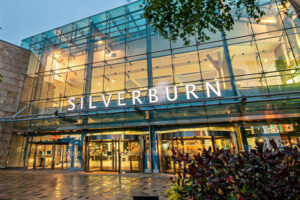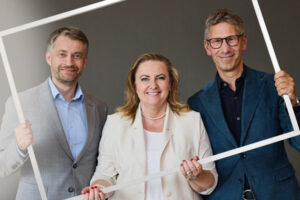ACROSS: Please briefly outline Immofinanz’s European retail portfolio (excluding Russia), for which you have been responsible since the end of July.
NICOLAS FERNANDEZ DE RETANA: It is a very exciting portfolio with development opportunities. It consists of two product groups, one part of which is composed of “Stop.Shop.”-branded retail parks and the other part – Vivo! – consists of shopping malls with entertainment and leisure alternatives. The largest number of shopping centers outside Moscow – four – is located in Romania. We also have one each in Lublin, Bratislava, and Salzburg. Regarding the strategy, we want to raise the profiles of these two product groups and strengthen them as brands. I am convinced that retail parks open up many opportunities. I can see that from my own experience in retail. There are more and more retail concepts looking to concentrate their presence in countries where they are already represented. The only exception is Inditex, which limits itself to category-A-cities. H&M and many others are pursuing concentration, however. Since we pay attention to market signals, we believe we can offer a unique selling proposition with a big box concept that is well developed in every respect – aesthetics, service, and functionality. Against this background, further developing our Stop.Shop. product group is a strategic focus for us.

ACROSS: How many Stop.Shop.s are there and how many more are you planning?
DE RETANA: We currently have 53. Numbers 54 and 55 are opening in the next few weeks. We plan for the number of Stop.Shop.s to grow significantly. We’re striving for a three-digit number, although we are partially doing this through the re-branding of retail parks that we already have in the portfolio. Our declared goal is for our Stop.Shop.s to become the market leader in their respective countries. For retail parks, as mentioned, it’s all about reaching a relevant number. This is the decisive argument for the tenants. When new retail concepts want to make the leap towards Europe, we will be able to tell their leaders that they should come to us because we can offer them a dense network and a large number of locations in multiple countries. That is our guiding strategic idea. That is why we are strengthening – in line with our products – the retail expertise within Immofinanz Group. We want to get to know our customers’ business models better and understand what they need and are planning.
ACROSS: How do you grow your Stop.Shop.s?
DE RETANA: We have a highly experienced development department that also develops our own projects. In addition, we are of course refurbishing our existing properties. Should the opportunity arise to acquire retail parks for our portfolio at a good price, we will do it.
ACROSS: How high is the demand for retail parks in your target markets?
DE RETANA: We see a high demand retail parks in all of our target markets – and also in other countries – as it is the perfect product for secondary and tertiary cities in lower-income areas in Europe. Even in Austria which has – together with Belgium – the highest density with retail parks we see enough potential. We believe that success can be achieved with qualitative optimization in Austria. It’s about refurbishment in other words. Most of the big box stores stem from the “boom” years between 1985 and 1990 and between 2002 and 2005, when they were built in a frenzy. Now we have to bring these existing square meters into the next generation. After all, the retail concepts themselves have changing needs and consumers’ shopping behavior changes as well. This is where the keyword “multichannel retailing” comes into play. If you have a large number of retail parks in Austria, it may make sense to offer Click & Collect services. This represents a contrast to central, supra-regional shopping centers.
ACROSS: What is the market situation in Romania and the other countries where you are active?
DE RETANA: In Romania, we see large potential for our retail parks. The same is true for Serbia. And in Poland, which already has a higher density with regard to retail space, there are still very interesting secondary and tertiary cities to expand.
ACROSS: How do things look with the returns in retail park segment?
DE RETANA: They are often higher than those of shopping centers, though the return is not necessarily the one and only important number. Big boxes are attractive insofar as they use the lower cost of space to provide a good platform for retailers that are increasingly under pressure. Retail is under pressure in general. Well-established retail parks are therefore a good alternative to more expensive space in shopping centers.
ACROSS: In the past, many retailers simply would not rent space in a retail park. That has changed somewhat. Is that for the reasons you have already mentioned?
DE RETANA: On the one hand, I see the cost reasons already mentioned, on the other hand, I suspect that it is no longer so important to retailers to be only present on the ground floor of malls in prime locations. This is where the concentration principle comes into play. It’s about offering retailers a lot of good locations throughout the country. Then you can attract brands into retail parks that you didn’t even have on the radar, even though it has long been considered unsexy to set up shops there. Following the concentration principle, more retailers will discover retail parks. I’m very optimistic about the Stop.Shop.s in that regard. This of course also allows consumers to find their favorite brands everywhere.
ACROSS: What parameters do you pay attention to when expanding your Stop.Shop.s?
DE RETANA: In general, there are a number of parameters you have to pay attention to when expanding with g retail parks. During product development, we identify the requirements a retail park must fulfill to be a good fit for a Stop.Shop. To date, the focus has been on the performance of the sector mix. Every company that offers retail space – Unibail-Rodamco, ECE etc. – tries to attract the best tenants in its segment for itself. So if e.g. Inditex or another large fashion group is on my “target list,” I have to offer them appropriate spaces. We believe in this context that we will be able to discuss a number of retail concepts in retail parks soon. We are following a deliberately offensive approach here. You can turn a retail park around by aligning it so that it is dominant in its environment. In addition, the length of stay is becoming an increasingly critical parameter. We want to motivate people to stay longer – with more gastronomy offers, services as well as with entertainment alternatives.
As far as the size categories, these vary, although our Stop.Shop.s in Serbia tend to be larger – more than 7,000 sq m. That in Niš, which opens soon, measures 13,000 sq m. Serbia is structurally undersupplied with retail space. In Belgrade, there are only two shopping centers and nothing on the outskirts of the city apart from a few retail parks.
ACROSS: What category of city is suitable for Stop.Shop.s?
DE RETANA: This mainly depends on the country. There’s no hard and fast rule. The purchasing power and the degree of concentration within the country decide, etc.
ACROSS: Let’s move from retail parks to shopping centers. What plans do you have for this product group?

DE RETANA: Our product is called Vivo!. They are mid-size shopping centers with 25,000 to 30,000 sq m that have a dominant role in their surrounding area. If we are talking about landmarks, we refer to successful community centers in secondary and tertiary cities. Apart from our two product groups Stop.Shop. and Vivo!, we can also – in individual cases only – imagine to implement some mixed-use large-scale products, like e.g. urban development.
ACROSS: How much do you want to grow in this segment?
DE RETANA: We want to grow in line with our plans for our Stop.Shop.s through acquisitions and refurbishments as well as own developments. Greenfield development, however, has lost relevance in the past decade as the market has changed completely and the spaces are gone. We are nowadays living in a world with too many square meters of retail. In such an environment, whoever optimizes his inventory best, wins.
ACROSS: What countries do you want to expand in with Vivo!?
DE RETANA: Unlike with our Stop.Shop.s, where we see no real limits to our growth, we’re focusing on our current core markets for Vivo!
ACROSS: How is the current price level in general developing for shopping centers that come into question for you?
DE RETANA: It’s difficult to name an overall figure. We consider Germany and Austria to be extremely interesting markets. If you buy a mall in Vienna now, you can expect a return of 5.0 to 5.5 percent. Immofinanz doesn’t buy shopping centers because of the return, however, but on the assumption that we can increase rental income over the next five years.
ACROSS: So you plan to keep the shopping centers in the portfolio as long as possible, right?
DE RETANA: Yes, we want to build portfolios and maintain them in the long term because we know that we live from the rental income.
ACROSS: Are there any objects in your portfolio you’d like to offload?
DE RETANA: Of course. We have already accomplished this to a certain extent in the past few years and a further phase of portfolio streamlining is still to come. The reason is that some objects no longer fit into our product categories.
ACROSS: Finally, an organizational question: How is your team set up?
DE RETANA: My team has a total of around 140 people, of whom 10 are managers in Vienna. It consists of an asset management team for each country. In the markets in which we have Stop.Shop.s, we have property management teams that are being expanded. I’m in the process of reorganizing and strengthening leasing management with key account responsibility and a clearer delineation from asset management. Leasing management will be an independent segment. Operationally, we will position ourselves in a somewhat less centralized manner. I envision working strategically in Vienna and operationally in the individual countries. We run the shopping centers in our portfolio ourselves, which is why my team has a center management structure. In leasing management, I am about to increase the all-important proximity to the retail market.
About Nicolas Fernandez de Retana
The graduate in Wirtschaftsingenieurwesen (business engineering)/civil engineering at the Technical University of Graz can look back on many years of experience in the international commercial real estate market and in the area of asset management. Nicolas Fernandez de Retana was recently employed by Leder und Schuh AG as Head of Retail, where he was responsible for the organization’s subsidiary branches in 10 countries. Before that, the 50-year-old worked in management positions in the housing and construction industries.





